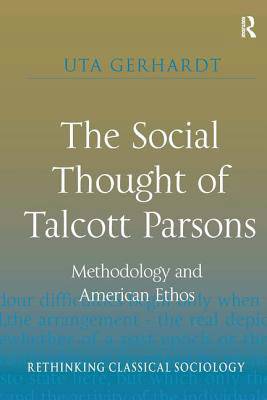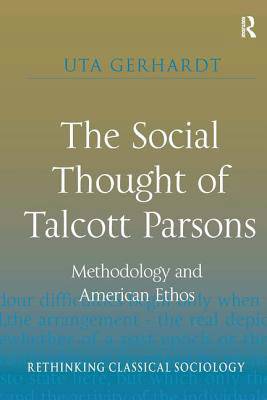
- Retrait gratuit dans votre magasin Club
- 7.000.000 titres dans notre catalogue
- Payer en toute sécurité
- Toujours un magasin près de chez vous
- Retrait gratuit dans votre magasin Club
- 7.000.0000 titres dans notre catalogue
- Payer en toute sécurité
- Toujours un magasin près de chez vous
216,45 €
+ 432 points
Description
The Social Thought of Talcott Parsons offers an insightful new reading of the work of Talcott Parsons, keeping in view at once the important influences of Max Weber on his sociology and the central place occupied by methodology - which enables us to better understand the relationship between American and European social theory. Revealing American democracy and its nemesis, National Socialism in Germany as the basis of his theory of society, this book explores the debates in which Parsons was engaged throughout his life, with the Frankfurt School, C. Wright Mills and the young radicals among the "disobedient" student generation, as well as economism and utilitarianism in social theory; the opponents that Parsons confronted in the interests of humanism. In addition to revisiting Parsons' extensive oeuvre, Uta Gerhardt takes up themes in current research and theory - including social inequality, civic culture, and globalization - offering a fascinating demonstration of what the conceptual approaches of Parsons can accomplish today. Revealing methodology and the American ethos to be the cornerstones of Parsons' social thought, this book will appeal not only to those with interests in classical sociology - and who wish to fully understand what this 'classic' has to offer - but also to those who wish to make sociology answer to the problems of the society of the present.
Spécifications
Parties prenantes
- Auteur(s) :
- Editeur:
Contenu
- Nombre de pages :
- 456
- Langue:
- Anglais
- Collection :
Caractéristiques
- EAN:
- 9781409427674
- Date de parution :
- 28-11-11
- Format:
- Livre relié
- Format numérique:
- Genaaid
- Dimensions :
- 156 mm x 233 mm
- Poids :
- 999 g

Les avis
Nous publions uniquement les avis qui respectent les conditions requises. Consultez nos conditions pour les avis.






